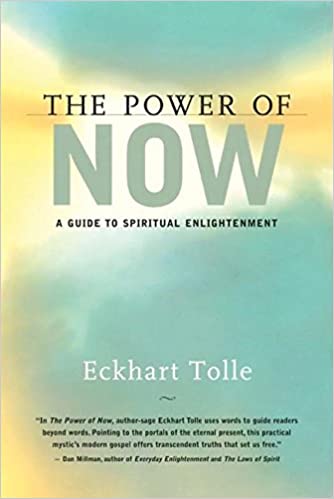The Power of Now — Book Summary
Introduction
The Power of Now is one of the most worthwhile reads in the field of personal growth. The author, Eckhart Tolle, underwent what can only be described as a complete spiritual awakening, following years of gripping anxiety and depression. This incredibly powerful book is a result of his new, awakened perspective and is a collection of his teachings to assist others to achieve this longed-for state of inner transformation. The book was initially passed round small bookshops and his teachings mainly spread through word of mouth. Today the book The Power of Now is an international bestseller and Eckhart Tolle is regarded as one of the most prominent spiritual thinkers of our time.
Interesting quotes from the book
Realize deeply that the present moment is all you have. Make the NOW the primary focus of your life.
— Eckhart Tolle, The Power of Now
Let your spiritual practice be this: As you go about your life, don't give 100% of your attention to the external world and to your mind. Keep some within.
— Eckhart Tolle, The Power of Now
Any action is often better than no action, especially if you have been stuck in an unhappy situation for a long time. If it is a mistake, at least you learn something, in which case it's no longer a mistake. If you remain stuck, you learn nothing.
— Eckhart Tolle, The Power of Now
Summary of the book The Power of Now
The central premise of this book is that living in the 'now' allows us to cease identifying ourselves with our mind and that this practice is the path towards true liberation. It describes how our minds create so much unnecessary noise and stress that we cannot witness our true self, which is the silent presence behind your mind. Without this knowledge, we are essentially slaves to our own mind and will be controlled by the negative, mundane chatter that we have running as a continuous monologue inside our heads.
This book can therefore be considered as a guidebook to free yourself from this and discover the power and peace that resides in the 'now'.
There are many helpful techniques in the book that allow the reader to move easily from theory to practice. By using these techniques the basis of our whole life and our way of interacting with the world can be improved.
Two methods of freeing ourselves from our mental chatter are 'watching the thinker' which involves paying attention to all of the thoughts that you think but in a completely detached and non-judgmental way, allowing them to come and go through your mind but not taking them seriously or allowing them to affect you.
The other way is to 'focus completely on the now'. This practice is very simple but incredibly powerful and is why this book remains so accessible. Focusing on the 'now' can be done anywhere. There is no need for a darkened room or a meditative state, it can be practiced when washing the dishes or climbing the stairs. The practice is purely focusing all your attention on the present moment. This allows your mind to stop chattering feverishly and stillness and calm to pervade your senses. Tolle suggests that intense presence in the 'now' allows you to see the god-presence in everything. Every cloud, stone, or creature reveals its holy essence.
Tolle also encourages the reader to turn all of the attention they place upon the outside world, inwards, and in doing so being able to realize the Source from which we all arise.
These practices allow you to begin to create a gap between your thoughts, where there is no mind but you are alert and aware. As you continue to practice, these gaps become more frequent and you can begin to see the mind as it really is, a tool to be used by you, not who you are. Believing that you are your mind is, as Eckhart states, a 'most dangerous delusion' and ultimately means that the mind has taken control.
Practicing these very simple techniques can make a big difference in your daily life with minimum effort.
The book then discusses the function of the ego and Tolle highlights how important it is to be able to disassociate yourself from it and its negative effects, using the practices discussed.
The ego is a false or phantom self, an idea of who you are based on certain cultural norms and experiences you had growing up. The ego does not live in the present; it exists always in the past or the future. It identifies itself and therefore your character, with things that happened in the past and is always looking to the future for improvement, i.e. when I have this or that, my life will be better. The ego also promotes a feeling of separateness, that you alone have these feelings or experiences and this blinds us to the true nature of being, which is that we are 'one with all that is'.
The body is also very important in our spiritual journey and developing the ability to tune in to our inner body is key to remaining in the present moment. We all have an inner energy field and part of the practice of being in the 'now' is to go within and focus on that field. With time and practice it will become easier and the field will grow stronger, helping us to face day-to-day challenges in a more effective, resilient way. Tolle likens this connection to our inner body to that of a tree with deep roots in the earth, strong and unshakeable.
So by utilizing the power of the 'now' we can experience what Eckhart refers to as no-mind, pure consciousness, or the Unmanifested. Focusing on silence and on the space between things are also additional practices, which allow you to disconnect from the world of shape and form. By remaining in conscious connection with the Unmanifested, you will automatically respect and love the manifested or physical world, however you will understand that nothing here lasts for very long and so you will essentially have achieved enlightenment.
A very important aspect of this quest for no-mind is how that state will affect your relationships. Eckhart observes that most love relationships these days swing between states of happiness and unhappiness. By looking for someone to complete us, we achieve what we think we are looking for initially but that most of the time this emotional high quickly turns to fights, sadness, and emotional violence. This is because normally both partners are ruled by their mind and are unaware of that. The ego is in charge and of course, the ego is always looking to attack others and defend itself. This cycle of loving behavior, followed by anger, jealousy, etc. will then either cause the relationship to destruct or the partners will be able to make excuses to carry on living with it.
The only way for a partnership to escape this cycle of emotion is to become intensely aware of the now. It is impossible for ego thinking to take over when this is happening, so focusing on the now yourself can improve your relationship for yourself and for your partner and can, as Eckhart states, make your relationship itself into a spiritual practice.
You will also no longer have to 'like' yourself. You will understand that there is no split between 'I' and 'Self' so there is nothing to like. You will simply be and this will allow all of your other relationships to be based purely in love.
Key Lessons from the book The Power of Now
Lesson 1: Live intensely in the NOW
Learn to live intensely in the now. Try to give every moment your full attention and gradually the power that your mind holds over you will fade and your whole life will improve.
Lesson 2: Practice different techniques for achieving greater presence
Watching the thinker, focusing on the now, listening to silence, becoming aware of space. All of these will assist you to separate yourself from your mind and be free from the interference of the ego.
Lesson 3: Observe the differences
Utilize your newfound presence in all relationships and observe the differences that occur.
Review of the book The Power of Now
This is a book to be referred to again and again. I have read and reread it countless times and each time find something enlightening or helpful to take away. The meditation practices are simple and easy to implement into a busy life, which I feel is very much in keeping with the simplicity of the book and its message. The sincerity of Tolle can be felt throughout this book and it is this sense of genuine peace and inner calm that greatly increases the validity of this book for me. I have just passed through a bereavement and I found the discussion of relationships to be very helpful when dealing with grief and understanding why we feel as we do at times of emotional stress. I really cannot recommend this book highly enough for anyone who is interested in spiritual growth and change.
Conclusion
In an age where the market is flooded with books within this genre, the Power of Now really stands out as a sincere account of a person whose truth and worldview has become irreversibly altered, and who is then compelled to share it in the hope of helping others. Written in a simple and relaxed style, it's concepts are presented in a totally accessible way and I feel that absolutely anyone would benefit from reading it. This book is a guidebook for modern day living and during these times of fear and unrest, its message is becoming more and more important.
Don't miss the other book summaries on SunInMe.org

